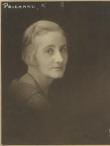Katharine Susannah Prichard was born in Levuka, Fiji during a hurricane. (She was called 'The Child of the Hurricane' by the local population and used the name for the title of her 1963 autobiography.) Prichard grew up in Tasmania and Melbourne, and was educated at home until she was fourteen when she received a half-scholarship to attend South Melbourne College. Although she matriculated successfully, her mother's illness and the family's poverty made it impossible for her to pursue university studies.
Prichard became a governess in country New South Wales, but returned to Melbourne to teach, and to attend night lectures on literature by Walter Murdoch. In 1908, a year after the suicide of her father, she travelled to London carrying a letter from Alfred Deakin that praised her journalistic skills highly. In London, she worked as a freelance journalist on assignment for the Melbourne The Herald, and, following her return to Australia, became the editor of the women's page of the Herald for two years. Five years later, Prichard returned to England to continue her writing career.
Prichard's first published fiction was the novel The Pioneers (1915), and her later novels included the 'outstanding' (Roderick) Working Bullocks (1926), Coonardoo (1929) and Haxby's Circus (1930). Her first book of stories was Kiss On the Lips and Other Stories (1932), followed by Potch and Colour, (1944). Her work is mostly set in the outback, depicting 'all the varied human types that live and toil there' with 'an unmistakable Australian atmosphere' and a 'glow of compassion' (Roderick).
In 1919, Prichard married Victoria Cross recipient and Gallipoli veteran, Hugo (Jim) Throssell, and they lived in the outer Perth suburb of Greenmount. For Prichard, literature and politics were always intertwined. Splitting her time between the two, Prichard continued to work on her fiction, while becoming a founding member of the Australian Communist Party in 1920 and a member of its central committee. Her son, Ric Throssell, was born in 1922. While Prichard and her sister were travelling overseas in Europe in 1933, Jim Throssell committed suicide.
In 1934, Prichard helped to set up the Australian Writers' League, and was elected federal president the following year. She co-founded the Unemployed Women and Girls' Association in Perth, and, in 1938, established the Modern Women's Club. In the same year, she was one of the founding members of the Fellowship of Australian Writers, Western Australian Branch.
Prichard's novels cover a wide thematic territory, including the colonial period and pioneer experiences in Australia, melodramatic romantic relationships, political ideas, the Australian landscape and environment and Aboriginal culture. The novels have been translated into numerous languages. In addition to her novels, Prichard also wrote short stories, drama, autobiography and some poetry.
Prichard continued both her political involvement, especially her commitment to the Peace Movement and to socialism, and her writing well into her seventies and eighties, and was nominated for a Nobel Prize for Literature in 1951 by the Western Australian branch of the Fellowship of Australian Writers. Her ashes were scattered in the bush around her Greenmount home. The house later became the home of The Katharine Susannah Prichard Writers' Centre – the oldest writers' centre of its kind in Australia.
Sources include: Roderick, Colin, Australian Round-Up: Stories From 1790 to 1950 (1953): 362 and Throssell, Ric, Wild Weeds and Windflowers: The Life and Letters of Katharine Susannah Prichard (1975).
 105114911019943976.jpg
105114911019943976.jpg